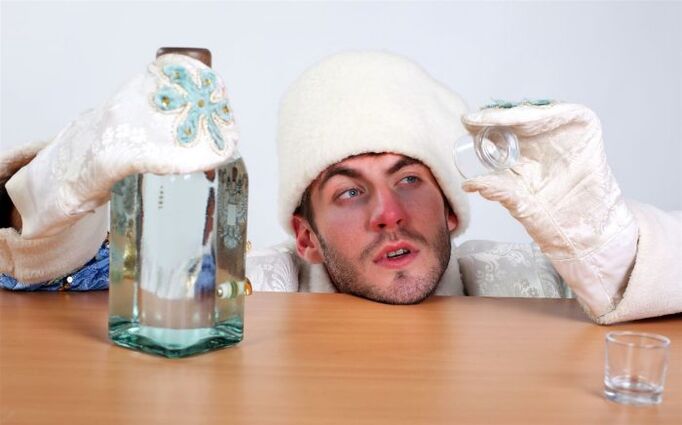Alcoholism is one of the most debated topics. It endangers family relationships and society as a whole. Not surprisingly, after a while, the patient’s relatives are wondering how to get the person to stop drinking?
Causes of alcohol dependence
Before you can figure out how to help a person stop drinking, you need to understand why you are drinking. By isolating the root cause, you are more likely to heal the person’s persuasion. More often, the onset of alcoholism is a psychological addiction, so it is important to help a person understand that this addiction is not a habit. In most cases, there are four reasons why people start drinking:
- for the company;
- stress relief;
- boredom;
- out of habit.
One popular reason a person suffers from alcoholism is alcohol for the company. As the only teetotaler among friends, it’s hard to maintain an unyielding attitude. For some, especially teenagers, it is a matter of honor to support the company in an endeavor.

If a person is surrounded by a non-rainbow environment and has constant workplace problems, they start drinking alcohol to relieve this stressful pressure. When you drink strong feelings, negative emotions, for a moment it may seem that the problem does not exist. It really doesn’t go away anywhere if you don’t make a decision about it. As a result, a possible way out in such a situation should be indicated. As soon as the intoxication passes, the person becomes immersed in negative emotions again and concludes that he should not stop drinking to avoid them.
Drinking from boredom is a loose concept. This is not a short-term situation where one has nothing to do. We are talking about a long period of time during which a person is put in a situation that does not allow him to use violence, to focus on something specific. In this condition, a mechanism that helps you reconcile with yourself is more often activated.
The most dangerous reason that makes it difficult to answer the question of how to help an alcoholic to stop drinking is regular alcoholism. In this case, it is difficult for a person not to drink, as the habit has become commonplace for him, and it is already difficult to imagine his life without him. In this case, the motivation to stop drinking must be very serious, otherwise it is almost impossible to convince a person to stop drinking.

It is often very difficult to single out a single cause for the origin of the addiction. It is all closely intertwined and interconnected. When alcoholism reaches its final stage, we are talking about a physical desire for alcohol. In this case, it is impossible to help with alcoholism without medication. If a person wants to get rid of the disease on their own, this is a great help in further treatment.
Does persuasion work?
How to cure an alcoholic? In fact, there are many ways to deter a person from drinking. The most popular method is to persuade and persuade the person to stop drinking. It’s a softer way to help her.
There is a more radical way to quit an alcoholic - it’s a nervous shock after drinking. This segment also includes intimidation of the patient. The third sector of assistance is the addition of various medicines or folk remedies to food. Before you understand how a drinking person can help you stop drinking, it’s worth figuring out what form of alcoholism will go to bed and exactly what made you addicted.

Since adding some medicated or folk remedies to foods is a very radical method that requires caution and prior consultation with the doctor, it is worth starting with milder methods, especially to help the alcoholic in conversations.
During these conversations, it is worth trying to persuade the person to stop drinking. The most effective way to persuade an alcoholic to be treated will be in the first stage of alcoholism, when the person has not yet lost the ability to critically perceive reality.
Before you start the conversation, think about the facts you give to the alcoholic. If you see him drunk, how awful he looks from the side, maybe it forces him to make radical decisions. Maybe he already wants to step out of himself, but the willpower doesn’t allow him for the lack of a "really important" reason.
How to convince an alcoholic that his habit is harmless? It is best to seek advice from family or friends. Only the closest people you trust should be in this conversation. In the first stage, it is easy to get a person out of alcohol. Suffice it to say about his drunken behavior, he shows me a tape of his recent party. If a person has not yet lost the ability to think properly, he is frightened and ashamed of his behavior and stops drinking.

It would be good to be reminded of a hangover, especially if it does not allow you to spend time with your family or the patient in a way you like. It is important to keep all habits, which means you have to spend money on it. Perform calculations by expressing them on movie trips, children’s tours, and other activities.
It is important to prepare in advance for the fact that your attempts to figure out how to force you to drink will be perceived with hostility, anger and quarrel. In this case, it is very important to note the answer to the question. Is it possible to cry or, on the contrary, to freely agree to the conditions prescribed by the patient? Not under any circumstances. It is better to explain in a calm voice that no one is forcing anyone, but why not pay attention to the available alternatives.
If you have managed to move away from the theory of how to convince someone to deal with concrete results, then by no means leave him or her in that situation. Continue to support, maybe he himself doesn’t know how to get used to the addiction. Not everyone can stop drinking at home. Find a suitable clinic, make an appointment with a doctor, help the person get there. Anyone who stops drinking needs more help than ever.
Other options
One of the undesirable options is bullying when you think about how it can help, quitting drinking is so hard and there is additional stress. It should be understood that this method of working may have the opposite effect.
This method is only suitable for patients who meet a certain psychotype. Some may perceive this behavior with aggression, which is obviously not the best reaction.
Not always any persuasion, argument, intimidation. Sometimes that’s not enough once alcoholism has gone to a deeper stage. In this case, you will need to use special medications. These can be ordinary medicines or some folk prescription.
With the help of drugs in industrial pharmacology, it is possible to feel an aversion to alcohol in a drinking person. Such methods are also available when a person is unable to accept them, although the desire to get rid of addiction directly helps to achieve more.

Medicines are added to alcohol or food. This often leads to a deterioration in well-being immediately after drinking alcohol. After a few such cases, the alcoholic begins to associate the bad condition with alcohol and thinks about stopping drinking.
Medicines used for such purposes contain disulfiram or cyanamide. As a result, the body is unable to process ethyl alcohol normally. Decomposition products accumulate in the blood, which will be the cause of long-term poisoning.
During this therapy, as soon as you notice the effect of the drug, it is worth talking again and asking the alcoholic to go for treatment. It is important to describe the benefits of inpatient treatment:
- relapse prevention;
- psychological help;
- continuous monitoring of health status;
- repair of internal damage.
The best way to get rid of addiction is through hospital treatment, where the patient is constantly monitored by a narcologist. With this treatment, the smallest number of relapses is observed.
Stages of alcoholism
Alcoholism is usually divided into three stages, each of which presupposes specific symptoms and a number of health consequences. The first stage is more difficult to identify the problem based on the person’s appearance. Without the knowledge of himself and those around him, one gradually increases the dose of the drink he drinks, as he gains some experience that does not allow him to achieve the desired degree of intoxication with the same doses of alcohol.
Already in this state, a person is unable to stop and stop drinking unless he or she is informed of the appropriate problem. After someone drinks, he begins to suffer from nausea and vomiting. Very often the patient has memory problems, not remembering what he did last night. Memory loss is partial.

As a result, after the first stage of alcoholism, one faces a steady increase in alcohol consumption. However, a drink can be repeated twice or thrice a week. The problem in this case is the lack of care for the loved one and the consequent worsening of the addiction.
When a person enters the second stage of alcoholism, external signs are more noticeable. The first bingers that appear, when a person drinks alcohol without a break for two to three days, talk about the development of second-degree alcoholism. At this point, the physical form of the addiction begins to take shape.
One will have a hangover as this is the only way to alleviate the condition. Such symptoms are clear signs of the second stage of the disease. In addition, the person suffers from constant weakness, headache, dizziness, nausea, sweating. An unpleasant tremor begins to permeate the entire body, first expressed in the hands. The second phase can take years, up to two decades, but can be limited to two years. In the last stage of the second stage, the person no longer has the opportunity to cope with the problem alone, only a doctor will help.
The last stage is the third. When it develops, everyone is able to see a person as an alcoholic. The look is starting to change. The man has a constantly swollen face, smelling of alcohol for a mile. By this time, many chronic illnesses are developing, with severe psychoses and other problems. In such a state, people are usually left without a family or surrounded by people living in the same state. In the third stage of alcoholism, one loses one’s social position, the ability to think critically. A return to normal life is unlikely in this case.
























